|
A lot of exciting stuff is happening for solo board gamers in the next few months! Expansions for old games, reprints of hard-to-find games, and some new adventures await us all.  More murder! How exciting! More murder! How exciting! Sherlock Holmes: Consulting Detective Expansion Originally printed in the 1980s, Sherlock Holmes: Consulting Detective has been in need of an English-language expansion for years. I myself have longed for an expansion on this very blog! But now fans of the game are going to get their wish: Ten new cases, in English. Four of them are thematically linked and allow you to chase Jack the Ripper and solve one of the greatest murder mysteries of all time. I truly cannot wait. I had been kind of dragging my feet on the last two cases from Consulting Detective because I wasn't ready for the game to end. Now I can really sink my teeth into them because they'll be an appetizer for more cases to come! 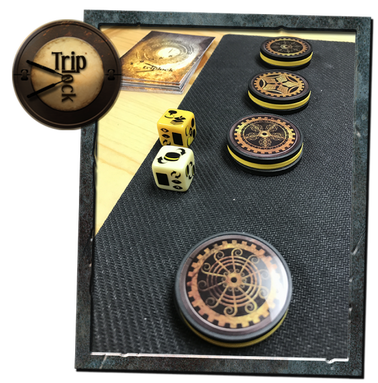 Triplock looks like it might be a lot of fun! Triplock looks like it might be a lot of fun! New Releases from Chip Theory Games Chip Theory Games is a game company run by two brothers who produce beautiful, high-quality games. They recently had a successful Kickstarter for a dice builder called Too Many Bones. I'm not sure about that one yet (at $125, it's an investment), but their most recent newsletter contained some other very exciting news. First, there are going to be two Hoplomachus expansions that introduce the cities of Carthage and Machu Picchu. If you haven't played Hoplomachus yet, you are missing out. It's a fun gladiatorial combat game that can be played solo, vs., or co-op, and it's enjoyable no matter how you play it. Adding more cities to the mix means more interesting mechanics to toy with. Also, I can finally play out my Rome vs. Carthage fantasies on a neoprene hex mat. In addition to expansions for Hoplomachus, Chip Theory Games is introducing a smaller solo or vs. game about lockpicking. It's called Triplock, and while there isn't too much information about it yet, it's visually very enticing. After all of the time I've spent picking locks in Skyrim and other video games, cackling all the while, I know that the lockpicking theme is totally going to do it for me. Plus, it'll be in a lower price range than most Chip Theory Games. Sign me up for this one. Terraforming Mars Reprint I'm sure I'm not the only one who didn't manage to get a copy of Terraforming Mars the first time around. The game sold like hotcakes, and based on the reviews, that's no surprise because it's excellent. As Stronghold Games has said both online and in podcast interviews, however, the second printing will be available at the end of January or in early February. Soon, new competitors will be able to join the terraforming fun! So far, 2017 is shaping up to be an exciting year in gaming for me. And this is even before any big new games are out—sometimes all you need for a good time is a well-timed expansion. With so many other stressful things happening in the world right now, I'm glad to have some good stuff to look forward to.
0 Comments
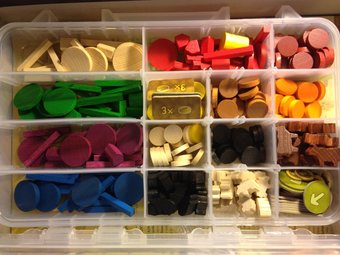 Fishing bait, Agricola tokens... same thing, right? Fishing bait, Agricola tokens... same thing, right? Sometimes, board games come in boxes with inserts that suit them just fine. Some publishers even include little plastic baggies in their game boxes to make it easier to sort tokens and other small pieces. (This is great, because I used to have to raid the kitchen for sandwich bags.) But if you've invested in an epic-size board game like Mage Knight, Robinson Crusoe, or Eldritch Horror, plastic baggies are quickly going to become a burden. You could spend an extra $20+ on a custom insert from Broken Token (and there is no denying those inserts are both functional and attractive), or you could do what I do: Raid the tackle box section of Wal-Mart. I usually end up with Plano boxes, which cost $2–4 apiece. The larger boxes I have purchased are in the 3600 size range. 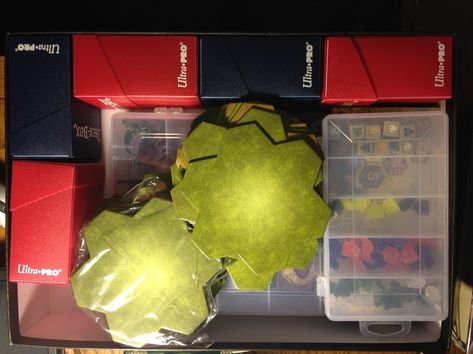 Mage Knight required two tackle boxes and several deck boxes. Mage Knight required two tackle boxes and several deck boxes. At first it felt a little bit wrong to throw away the original inserts. Robinson Crusoe had a fun one that looked like the inside of a treasure chest. But I tossed it in favor of easy setup and well-organized game tokens. I don't even remember what the insert for Mage Knight looked like, which either means that it was unremarkable or that I have gotten over the guilt of tossing out things like that. Mage Knight was one of my bigger organization projects because it's such a heavy game that comes with so. much. stuff. But I'm satisfied with how it turned out! My current setup includes both the main game and a couple of the expansions. 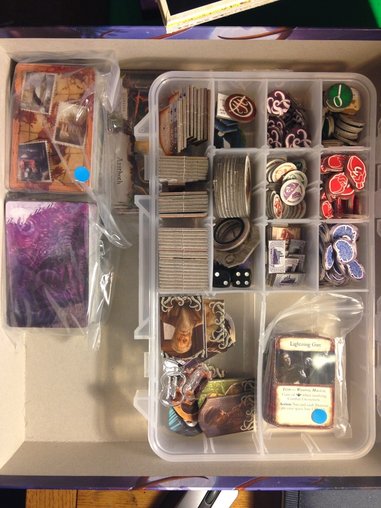 An Elder God may be coming, but at least I'm organized. An Elder God may be coming, but at least I'm organized. Organizing my game tokens is not just about organization. When I get a new game and have to figure everything out for the first time, it can be a little bit overwhelming. I find that creating my own way of storing the game helps me work through the rules and to understand the game a bit better in general—you have to know a little bit about what you're doing if you want to organize something well. It's also a bit therapeutic, as the many of you who like to punch cardboard know already. Organizing games according to my own system also makes it easier for me to set them up later, because I already "know my way around" and there is a logical place for everything. I also like being able to make room for expansions within the original boxes to the greatest extent possible. (Although my Sentinels of the Multiverse box has become absurdly heavy because of this tendency.) If you love to play board games but you sometimes feel frustrated and disorganized, trust me, there are ways to handle this problem. Tackle boxes are great because they not only keep your pieces organized, but they can just be set alongside the game board and used throughout the game—no need to empty and then refill a bunch of plastic baggies to create token banks. What board game organization schemes have you guys come up with? Leave me a comment—I'd be very interested to hear about how you make game setup and storage more efficient. 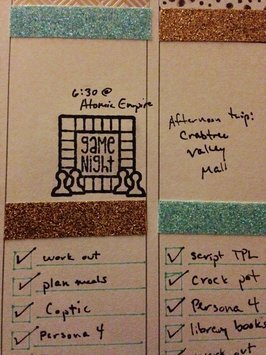 That's right. I put Persona 4 on my to-do list. And I used glitter tape. That's right. I put Persona 4 on my to-do list. And I used glitter tape. This year, I've made a stronger commitment to planning and getting organized, and I've invested in an Erin Condren planner. I've also been experimenting with stickers, stamps, and washi tape to make my week seem more beautiful and fun, even if I'm doing a whole lot of unpleasant stuff (it's testing season). What, you might ask, does this have to do with playing board games? I've started planning in game time. One of the most interesting things about looking over your planner is seeing what you were up to at any given point in your year. Your to-do lists send subtle messages about what you thought was important at the time you made them. Last year, I tended to let work take over my entire day, and it left me overextended and frustrated. When you're busy, self-care is usually the first thing to go. Because I play a lot of solo games, it's especially easy to skip a play session. Outside pressures are high, and if I don't play, I'm not disappointing anybody but myself. To help me solve the problem of work creep—where work slowly takes over all of your play time—I have begun to deliberately put gaming and other fun stuff in my planner. Just seeing an activity on my to-do list, the check box unchecked, compels me to complete it. Even if that activity is taking a nap. In other words, I'm using my own workaholic nature to force myself to relax and have fun. And so far, it's working! We live in a world that glorifies work to the exclusion of almost everything else. But to be a more functional human being, I need to play. Scheduling game time in my planner helps me remember to take decent care of myself, even when I'm stressed. 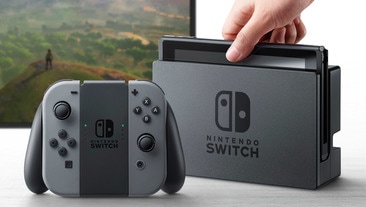 March 3 can't come soon enough. March 3 can't come soon enough. My boyfriend and I have a complicated emotional relationship with Nintendo. Over the past couple of years, Nintendo has favored limited print runs of a lot of its products (as I discussed here), and it often feels like the company is both dishonest and out of touch with its consumers. Nintendo reps are as slippery as politicians when speaking about the company's future plans. For example, in March, Nintendo denied rumors that it was planning to stop production of the Wii U. By November, Nintendo confirmed that production of the Wii U is indeed coming to a close. Nintendo also suggested for a long time that the NX would not be a replacement for the Wii U, although that's clearly what the Switch is intended to be. That said, we still went out and preordered the Nintendo Switch this week. And I'm really excited about it for two major reasons. 1) Nintendo is willing to experiment. I like that Nintendo consoles have a totally different vibe from other gaming devices. Although I am not an XBox or PC gamer, I own and love a PS3, PS4, and Vita. I feel like people who play on any of these platforms are able to have some common gaming experiences. When it comes to XBox or PlayStation, choosing a console is mostly a matter of personal taste and possibly a preference for exclusives like Fable (XBox) or Uncharted (PlayStation). PC gamers have a wider range of options, but a lot of games are released for both console and PC. Nintendo, on the other hand, is never afraid to offer something completely different. The Switch is unlike any console out there. Not only are the detachable controllers going to lead to games with interesting mechanics, but Nintendo is never afraid to release weird games in general. (Game & Wario, anyone?) One of the mini-games in 1-2-Switch, one of the launch titles, is going to involve milking cows, and another will allow for living room sword fights that allow you to focus on your opponent instead of the screen. (Alas, I might be waiting until it comes down in price.) I'm also excited about Arms, a fighting game in which you and your opponent wail on each other with weird, stretchy appendages. This is too wonky and fun-looking NOT to play:  Hi-Yo, Epona! Away! Hi-Yo, Epona! Away! 2) Nintendo first-party games are excellent, period. Even Wii U haters will admit at this point that the console's failures were not a result of bad games. The Wii U has had some incredible releases, including entries into established franchises such as Super Mario 3D World and new IPs like Splatoon. The Wii U's gaming tablet also allowed for interesting and creative games like Mario Maker. Although the Switch has a weak initial lineup, I expect to be occupied with Legend of Zelda: Breath of the Wild for quite some time. And I have no doubt that Super Mario Odyssey and Splatoon 2 will be excellent—and here relatively soon. If you judge Nintendo by the quality of the first-party games it produces, you cannot help but have faith in Nintendo consoles, even when the business end of things is clumsy. Nintendo has been stumbling in the last few years. It's not clear that they have learned their lesson with the Switch. The company has also picked up a lot of haters—even some Gamestop employees have openly pooh-poohed our Nintendo purchases over the past few years, and I have to wonder if that attitude has impacted sales to undecided consumers. But without Nintendo, something would be irrevocably lost from the world of video games, and I don't want to see that happen. So we're getting a Switch, and I have faith in it. Nintendo can always be trusted to do one thing: produce excellent games that will be fun and different. Also, by early March, Epona and I will be riding off into the sunset, and I can't wait. 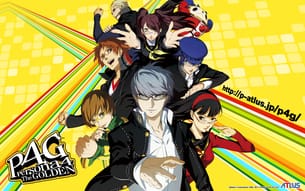 After a long dry spell, I've found time to play a video game. (Thanks, Winter Break!) I've busted out my PS Vita and finally, finally gotten around to playing Persona 4 Golden. It's one of the PS Vita's most beloved games, and I can see why: I'm a little over halfway through the game, and I'm still deeply engrossed in the story. I love games that are heavy on story, so a good JRPG can hold my interest for quite a while. Persona 4 Golden is about more than grinding through battle after battle and leveling up enough to face a big boss. To maximize your potential within the game, you need to develop certain personal traits, such as courage, understanding, expression, and knowledge. You also need to strengthen your social bonds with the people around you, especially your friends and family members. Every part of every day in Persona 4 Golden can and should be used in a productive way, whether you choose to study in the library, go on a scooter ride, or chill out with your adorable little cousin. Trying to maximize the benefits I get out of my "free time" in Persona 4 Golden is fun, but it's also interesting to think about in the context of my actual life. Trying to make sure that I'm using my time in a way that actually benefits me is easy to do in a video game, but shockingly difficult to do in reality. How many hours have I allowed to slip by because I started clicking links on Facebook? How many times have I come home and intended to read or play a board game, but ended up staring off into space instead? Persona 4 Golden also keeps track of your relationships in a concrete way, which really makes you think about friendships. There are characters in the game that I forget to hang out with because I "see" them all the time, but I later realize that I've done nothing to actually deepen the relationship. How many friends do I see every day at work without bothering to really get to know them? I live with my boyfriend, so I see him all the time, but am I really investing enough in quality couple time? Obviously, life isn't a video game. Sometimes you just need to veg, and relationships/me-time can't be quantified in real life. (Too bad: Think of all the knowledge points I'd get for all of the reading I do!) But maybe there is a lesson to be learned from the social mechanics of Persona 4 Golden. I love the idea that time spent reading, studying, or bonding with other people has intrinsic value. How differently would we live our lives if we felt that way outside of video games? 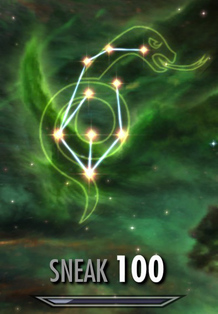 All the sneaking. All the sneaking. Although I vastly prefer board games to video games these days, I am dying to try out Dishonored 2. I loved the first Dishonored, and I also adore any game that allows you to surveil an area, learn the guards' positions, and sneakly disable your opponents before they even realize you're there. My Skyrim character is a Khajiit assassin, and my favorite weapon in Far Cry 3 was obviously a sniper rifle. Reviewers panned it, but I love playing Thief because I enjoy creeping around the levels and feeling invisible. That is the one feeling that I can't truly get from board games. There are, of course, hidden movement games or social deduction games that require a certain amount of sneakiness and misdirection. Escape From the Aliens in Outer Space looks like it might scratch my stealth itch. But when you play a board game that involves those mechanics, both players are already hyper aware of each other and in a state of conflict. You can't get that feeling of sneaking in while no one expects you and then slipping away before anyone realizes you were there. The increasingly impressive AI in a video game can create that feeling. But I wonder—now that we have board games such as Mansions of Madness or Descent that can be run using an app, would a stealth board game of that nature be possible? I would be very interested to see it. 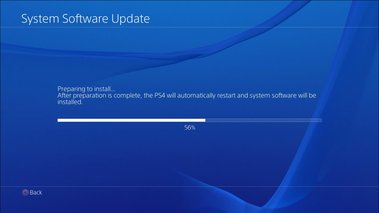 NOOOOOO! NOOOOOO! Sometimes I avoid playing heavier games because of the long setup and takedown time, especially if the games have complicated rules that will require a refresher. (I'm looking at you, Mage Knight.) But I've been in the mood to play video games again lately, and when I put Dying Light into my PS4 to give it a try, I was in for a nasty surprise: The installation and updates were going to take hours before I could even start to play my game! And that was after another lengthy system update. The experience provided me a serious reminder of why I don't play video games as much as I used to. If you're in the mood to play one, but haven't been indulging regularly, you will probably get slammed with a long waiting time before you can actually scratch that itch. Sometimes, if the updates are egregiously long or require me to go in and delete other stuff from my PS4 hard drive, I will just forget about it and go get out a board game or try something on my 3DS. (Nintendo, for all its flaws, is very good about making it possible to pick up and play video games.) It can take a little while to set up a board game, especially if it's heavy or unfamiliar. But I'd rather be engaged with the setup process than helplessly watching the load bar and wishing I had the money for a better internet connection. I feel bad for all of the kids who will get a Playstation for Christmas this year, but their parents didn't know to set it up the night before! As for my video game craving, I guess I'll always have my handheld consoles... and we teachers are almost halfway to summer. 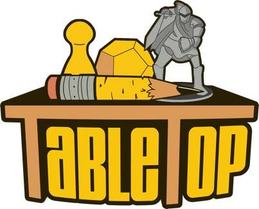 Geek and Sundry, Felicia Day's passion project and the source of fun shows like Wil Wheaton's TableTop and RPG-centered Critical Role, has been undergoing some major changes recently. Its shows used to be freely available on YouTube and other online platforms, but as many of you know, that is about to change. While TableTop used to be funded by other means, including crowdfunding, Geek and Sundry is now part of the Legendary Digital Network—and LDN is putting a lot of Geek and Sundry content behind a paywall. Now, if you would like to watch TableTop as the episodes come out, you will need to purchase a subscription to LDN's "Alpha" program and pay $4.99/month. I understand that creating online content takes both time and money, and I understand that artists need to be compensated for their work. But I'm going to be real: I don't think an Alpha subscription is worth paying for. I just got the email asking me to officially sign up, and most of the stuff being advertised sounds like... well... a bunch of YouTube shows plus some chat rooms and forums. I am not already hooked into the Geek and Sundry network and I have only watched TableTop. The descriptions of other shows offered through Alpha sound pretty blah, which means I would only be subscribing to watch one or sometimes two shows. Besides, if you are willing to be patient, TableTop will be available to everyone on YouTube at the end of January. I can wait. So really, I have no incentive to subscribe at all. Legendary, then, may have made a mistake: If other relative outsiders are like me, they won't be attracted enough to their programming to subscribe. Even worse, Geek and Sundry subscribers on Twitch and integral members of the community pre-Legendary seem to feel extremely alienated. There has been a lot of commentary on Reddit about Geek and Sundry and the departure of many of its original team members. There was even an AMA about Alpha that looked pretty acrimonious to me. What is the point of alienating the community you have while also not doing all that much to attract outsiders who might grow your viewer base? There is probably a way to make consistent money off of nerdy content. But I'm not sure Legendary Digital Network has quite figured it out yet. Wil Wheaton's own comments on the situation are telling: "I'm not thrilled, and it's entirely out of my hands. I probably shouldn't say much more about it right now."  I was sick yesterday, and stayed home from work. Although I didn't feel great physically, the day was mentally fantastic—between school and the fact that my boyfriend and I have the same work schedule, I am almost never by myself at home. Yesterday, it was just the cats and me, and it was bliss. Sometimes it seems like people either hate being alone or feel like they need to justify their desire for solitude. While I was scrolling through Facebook between naps yesterday, I noticed that one of my acquaintances had posted a Huffington Post piece called "The Stigma of Doing Things Alone." As it happens, I love to travel alone, eat out alone, go to the movies alone, and generally be alone. This is probably why I also like to blog about playing games... alone. (Well, a lot of the time.) I even wake up early because I love the quiet hours of the morning when no one is awake but me. One of the things that concerns me most about my students is how much they hate solitude. Even when they are not talking (a rare occasion), they are determined to listen to music and to stay in constant contact with each other through Snapchat, Instagram, and Kik. But if you're always listening to someone else's voice, how do you ever hear your own? How do you tap your inner creativity or decide what kind of person you really are if you are never alone with your thoughts? Can you really be a complete person if you don't have the internal resources to entertain yourself for a while with no outside stimulation? I love board games in general, but solo games bring their own special joy. Have you ever read a book and enjoyed it so much that you didn't want to talk about it with anyone else? Sometimes, when I play alone, it feels like a game was made just for me, every twist and turn a secret for me to savor. Gaming alone isn't just something I do because no one else is around to play with me. It's something I carve out time to do because I like it.  As a teacher, I am often forced to make choices that weigh on me. Did I really give that student the help he or she needed? When a student acted out, did I successfully manage to correct the behavior while maintaining a positive relationship? As the co-sponsor of a board game club, my job becomes surprisingly difficult. The club is supposed to be fun, and it is. Every Friday afternoon, my classroom is packed with students who are excited to be at school late on a Friday. What is even better is that many of my game clubbers are the "nerds" of the school who are finally in a place where they can be themselves. The students do more than play chess or other games: They argue about comic book characters, try out weird voices at each other, and swap tips for Skyrim quests. One of the female students who attends is so quiet, so much of the time, that I was stunned (and delighted) when she realized I had a PS Vita and gushed to me about Danganronpa for half an hour. For one hour after school on Fridays, my classroom is a place of pure happiness and acceptance. I am also delighted to say that our club has more young women this year than last, and that many of them are excited to face off against the boys over a chess board. Everywhere I turn, there are more teenage girls playing Wii, joining in a game of Ivanhoe, or just working on our current jigsaw puzzle. It is awesome. Given that nerd culture is widely thought of as female-unfriendly, and that we are now watching our own politicians twist themselves in knots about whether it's okay to talk about "grabbing women by the p***y," it's of extreme importance to create environments where women are not only safe, but welcome and respected. The integration of young women into my club is also where some of my challenges as a sponsor come from: I occasionally have issues with boys who are comfortably among their friends and who want to talk to each other in sexist ways as part of their nerdy "locker room talk." We've already had conversations about not describing victory or defeat in terms of rape, and about not referring to each other as "b****." But interventions are not always successful. One kid just got kicked out of my room for a week for saying that a boy he was arguing with was "on his period," then doubling down when I asked him to stop by saying that the other kid "forgot his tampons." He is about to get his ban extended because he keeps coming to me to argue that his comments were not offensive. It's infuriating. Most of the boys who persistently engage in nerd macho talk are themselves insecure. They are searching for a place where they can feel comfortable in their own identities. As their teacher and mentor, I don't want them to feel rejected or ostracized. But it is also my duty as an educator to protect young women who never deserve to be spoken about in ways that perpetuate the idea that they are inferior to men or that their bodies are up for discussion by men. For now, my solution is to call out sexist comments when I hear them, and to temporarily ban repeat offenders. (Kids should always have another chance to come back and prove that their behavior has changed.) My male co-sponsor and I have both had meaningful conversations with students about how to treat other people. But I don't always know how to permanently change attitudes, especially among the boys who can't seem to drop the bravado and who are more interested in impressing other boys than in impressing their teacher. Sometimes I feel torn about it, because those boys are often the ones who need acceptance and support the most. But here's the bottom line: I can't grant that acceptance (or let them try to earn it from their peers) at the expense of other students—especially female students who are just starting to embrace their own nerdy identities. Students who trust that my game club is a place where they are always welcome. Maybe the actions that I take will have an impact a while from now, when I'm not around to see. Or maybe if other teachers, mentors, game group leaders, and friends all send the same message that I'm sending, we can collectively help nerd culture to change. I can't do it all on my own. So if any of you, readers, are in a position to call out sexism (or other prejudice) in your gaming club or group, it's your moral obligation to do so. If you don't, what attitudes and behaviors are you validating? |
AuthorMy name is Liz Davidson, and I play solo board games. A lot of solo board games... Archives
August 2021
Categories
All
|
 RSS Feed
RSS Feed